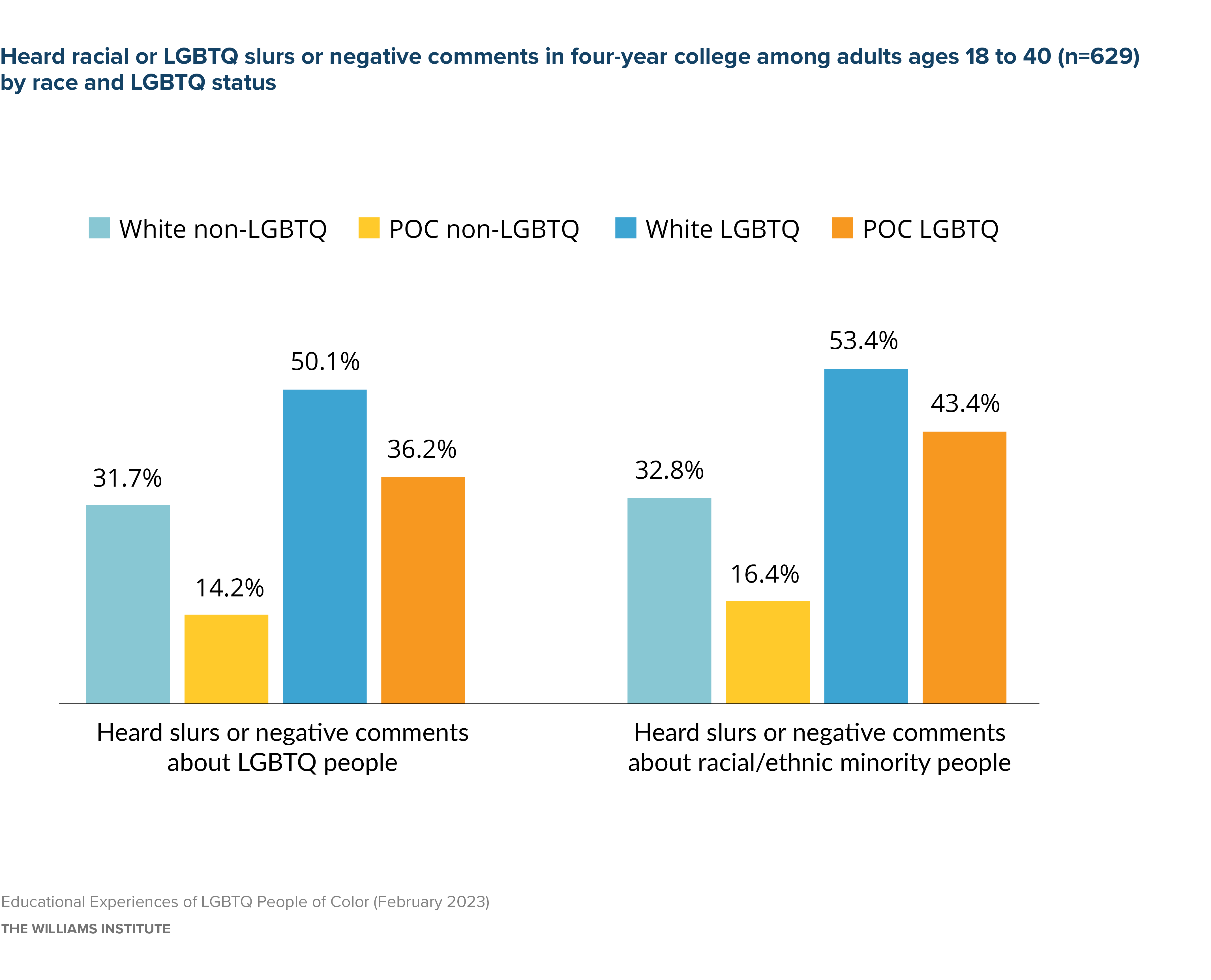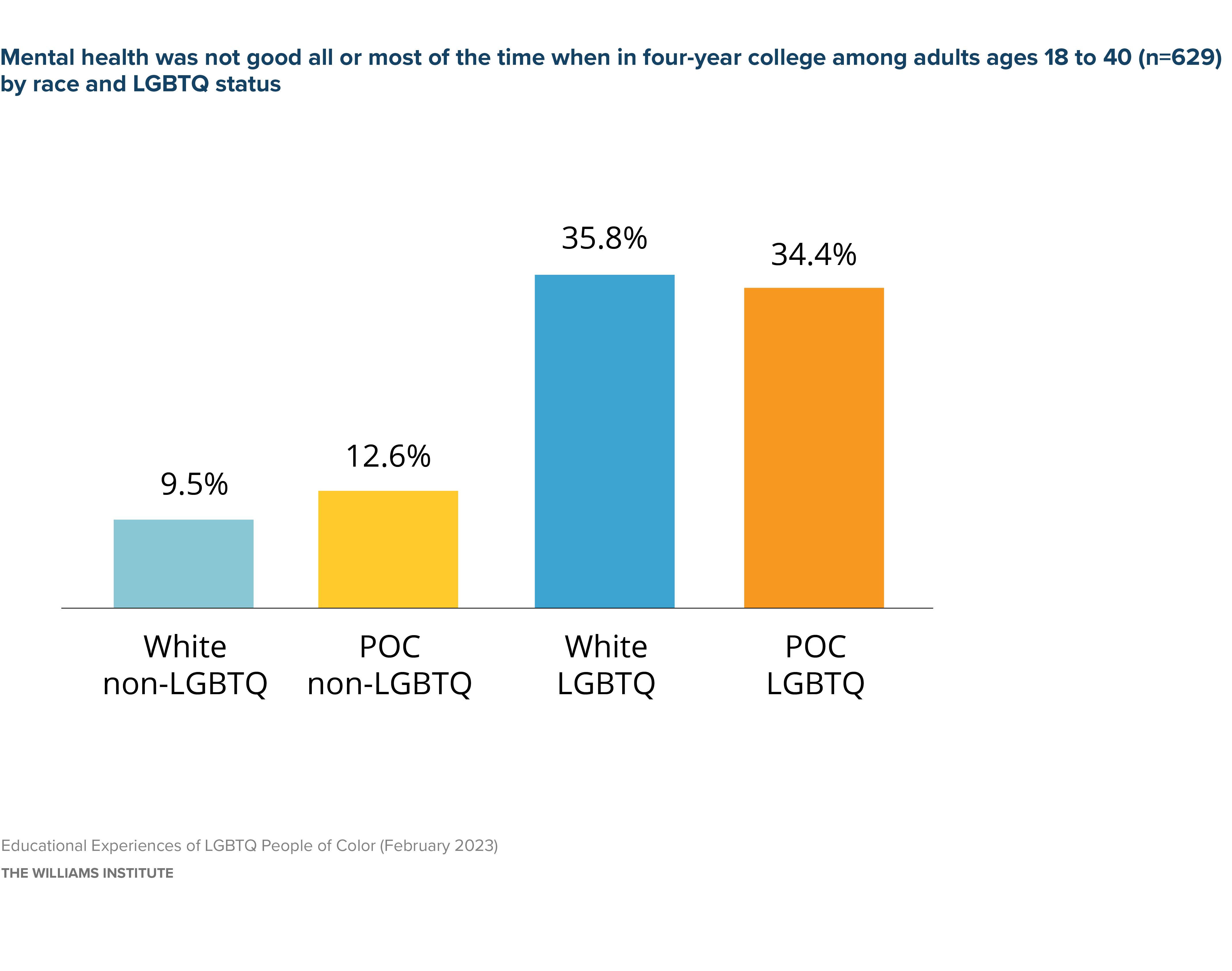Executive Summary
The American Association of Colleges and Universities embraces equity as a priority and acknowledges that safety and belonging are necessary to support student learning. Yet, little is known about the experiences of LGBTQ people of color in higher education—despite their vulnerability to inequitable treatment and marginalization. This study uses data collected from a nationally representative sample of adults ages 18 to 40 (N=1,079) on the Access to Higher Education Survey to provide information about the school experiences and higher education environments of LGBTQ people of color. Information about families of origin and family support is also provided.
Findings for White LGBTQ and non-LGBTQ people of color (POC) are frequently included to highlight similarities and differences in experience by both race and sexuality and gender. Notably, we find that more than twice as many LGBTQ POC as White LGBTQ adults report that unfair treatment at school due to being LGBTQ was a barrier to their academic success (10.4% vs. 4.4%), and that lifetime school-based unfair treatment, harassment, or bullying due to being LGBTQ was a barrier to getting the amount of education, training, or degrees that they wanted (14.6% vs. 6.5%). Consistent with these findings, among adults ages 25 to 40, fewer LGBTQ POC had completed a post-secondary degree or certificate compared to their White LGBTQ peers (55.5% vs. 69.5%).
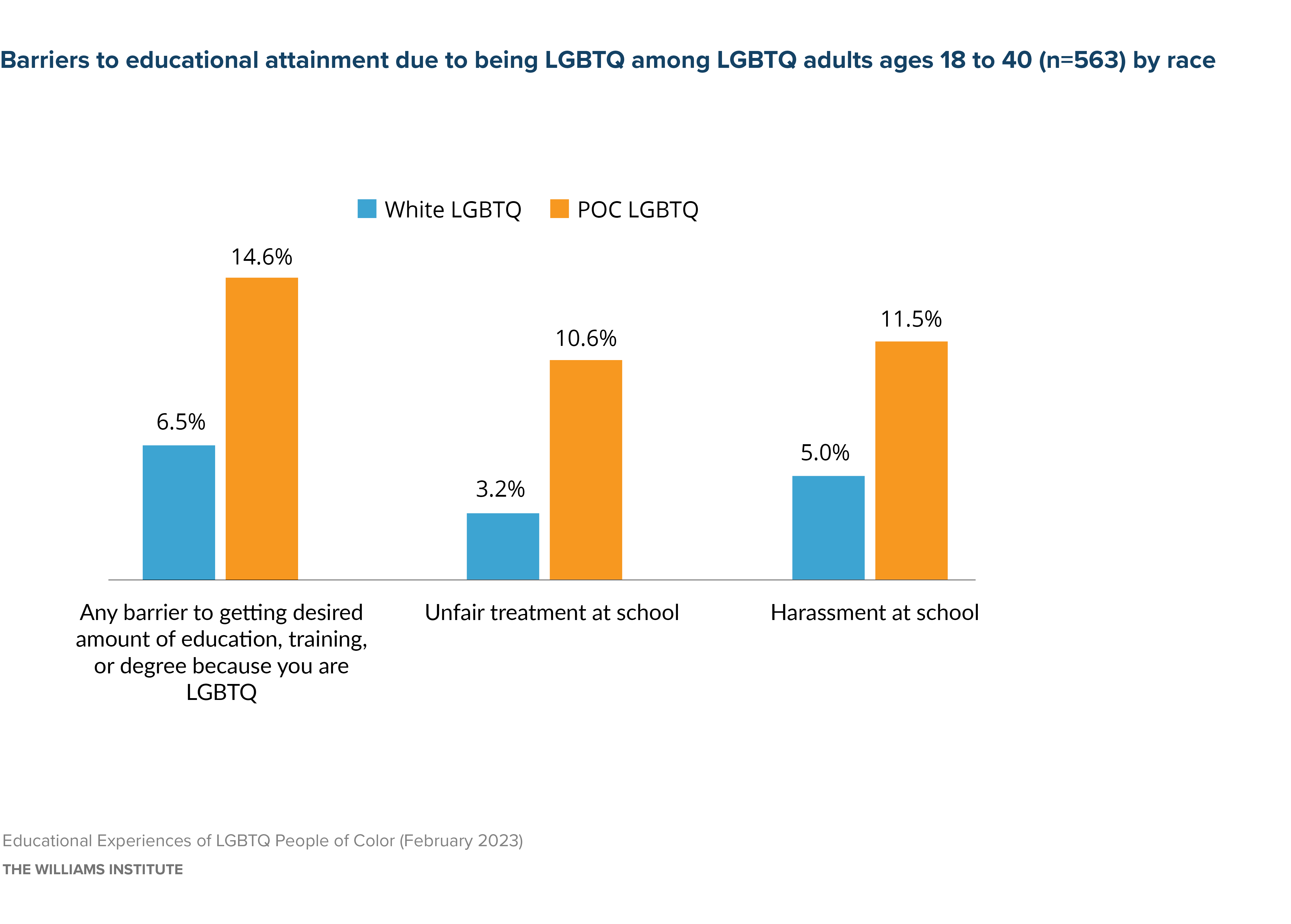
About one in seven (14.5%) LGBTQ people of color had ever attended vocational, technical, or trade (vo-tech) programs, 37.6% had been to community college, 47.0% had been to four-year college, and 10.5% had been in graduate school. More than a quarter (28.1%) were current students at the time of survey completion.
Childhood Socioeconomic Status and Parental Support
Family support for higher education among LGBTQ POC was high and was comparable to that reported by White LGBTQ peers, despite lower family socioeconomic status. Slightly more than a third (35.4%) of LGBTQ POC indicated that someone in their childhood household (before they were 18) received public benefits (i.e., supplemental income and food assistance benefits). Less than a quarter (24.4%) of White LGBTQ adults reported household utilization of public benefits. Similarly, a third of LGBTQ POC had parents with no more than a high school education—about twice as many as their White LGBTQ counterparts (33.5% vs. 17.5%) and at nearly identical proportion (34.0%) to non-LGBTQ POC.
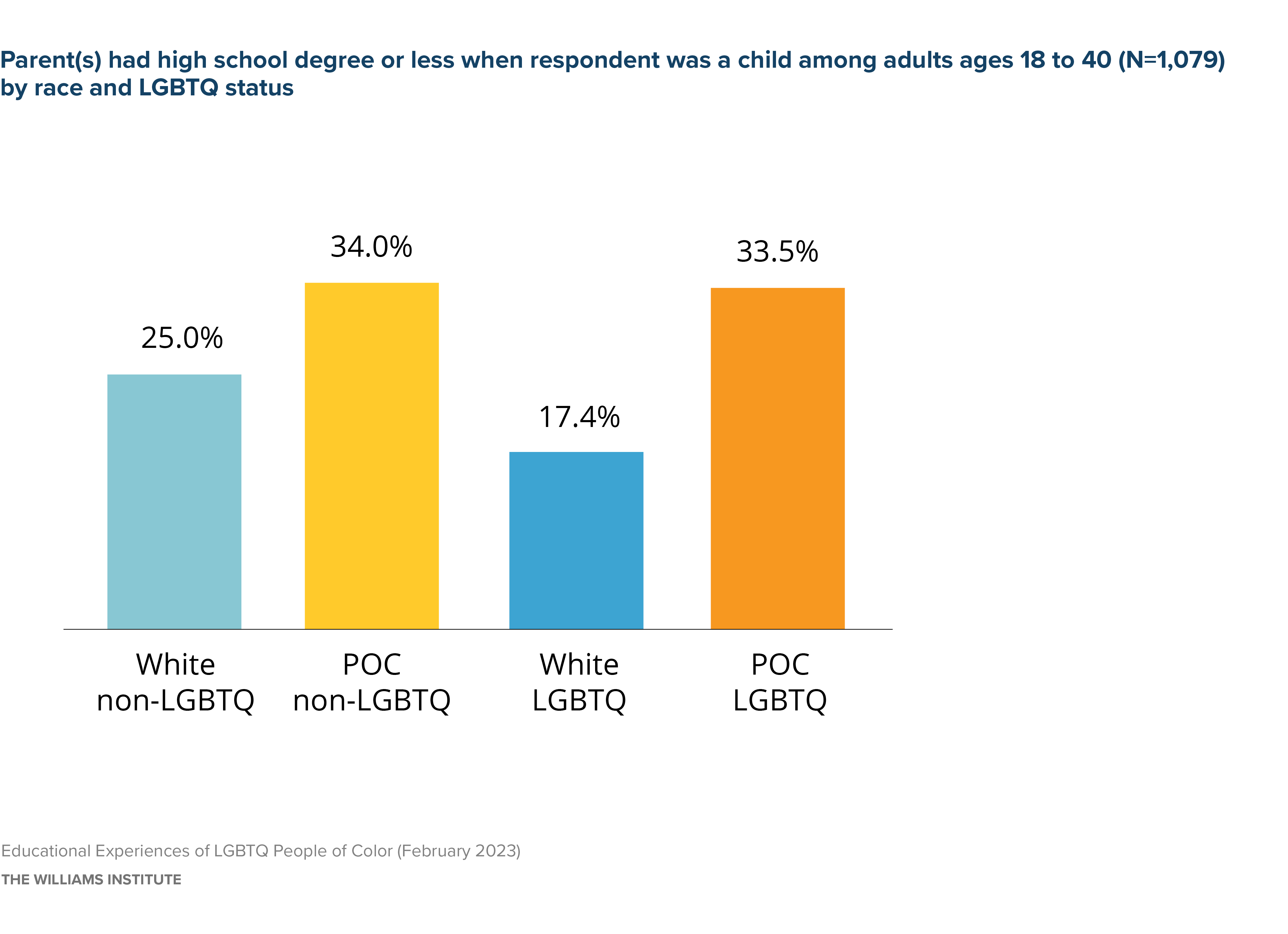
LGBTQ POC reported similar levels of encouragement and information to pursue higher education as other respondents. More than two-thirds (69.0%) of LGBTQ POC were encouraged by a parent/ guardian to go to college when they were in high school. Although about one-third (32.6%) of LGBTQ POC received a lot of information about college applications from high school counselors and teachers, another third (33.4%) received very little or no information about college applications from these sources. More than one-third of LGBTQ POC indicated that they received very little or no information about college entrance exams (41.3%), letters of recommendation (47.7%), and financial aid (40.5%).
More than half (59.1%) of LGBTQ POC came out to their parents at or before the age of 18 and a quarter (25.7%) came out to their parents between the ages of 19 to 25 (the age at which many young adults pursue higher education). The remainder (37.0%) were not yet out at the time of survey completion. Among those who were “out” as LGBTQ to their parents at age 18 or younger, 40.8% of LGBTQ POC reported that a primary parent was quite a bit or completely accepting of them as an LGBTQ person, 25.8% reported that a parent was somewhat accepting, and one third (33.4%) reported that the primary parent was not at all or only a little accepting of them as an LGBTQ person. Findings were similar for White LGBTQ people.
Some LGBTQ people look to college as an opportunity to distance themselves from their families. LGBTQ POC were more than three times as likely to pick a four-year college elsewhere to get away from family as their non-LGBTQ POC peers (34.3% vs. 11.1%). About four times as many LGBTQ POC selected a four-year college in a different city or state to find a more welcoming environment than their non-LGBTQ POC counterparts, 18.0% vs 4.0%, respectively. Findings were similar for White LGBTQ adults.
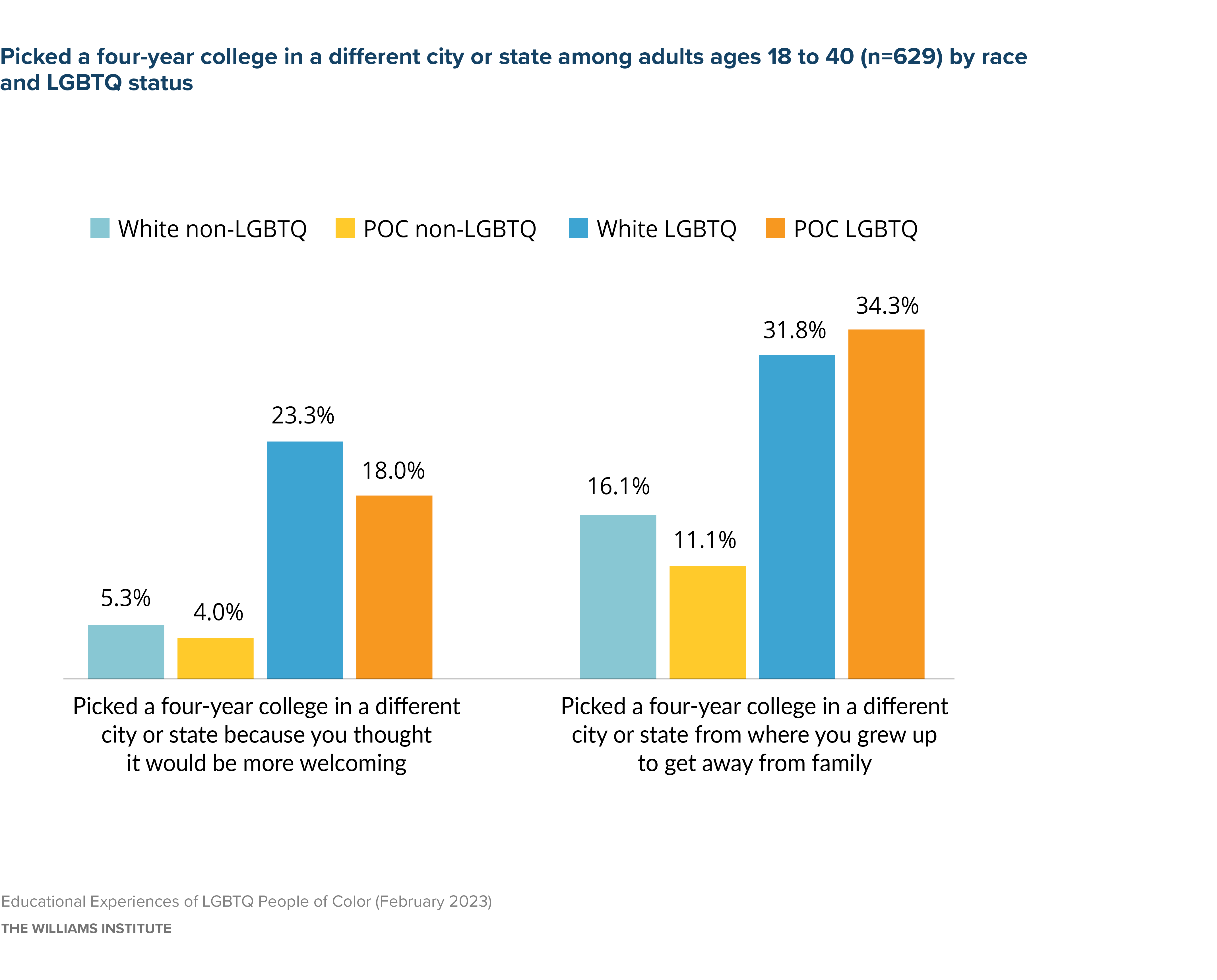
Barriers to Educational Attainment Due to Being LGBTQ
LGBTQ people of color reported experiences of not fully belonging, needing to hide their sexual orientation or gender identity at school because they are LGBTQ, and experiences of unfair treatment, harassment, or bullying that impacted the quality and quantity of their education.
Nearly one in four (23.4%) LGBTQ POC felt that they did not fully belong at school at some point in their lives because they are LGBTQ. About four in 10 (42.7%) LGBTQ POC reported ever needing to hide their sexual orientation or gender identity at school because they are LGBTQ. Findings were similar for White LGBTQ adults.
In community college and four-year college programs, more LGBTQ POC and White LGBTQ people than non-LGBTQ people reported experiencing bullying, harassment, or assault. For example, about a quarter of LGBTQ POC experienced bullying, harassment, or assault in four-year college—nearly twice as many as their non-LGBTQ POC peers (26.3% vs 14.3%).
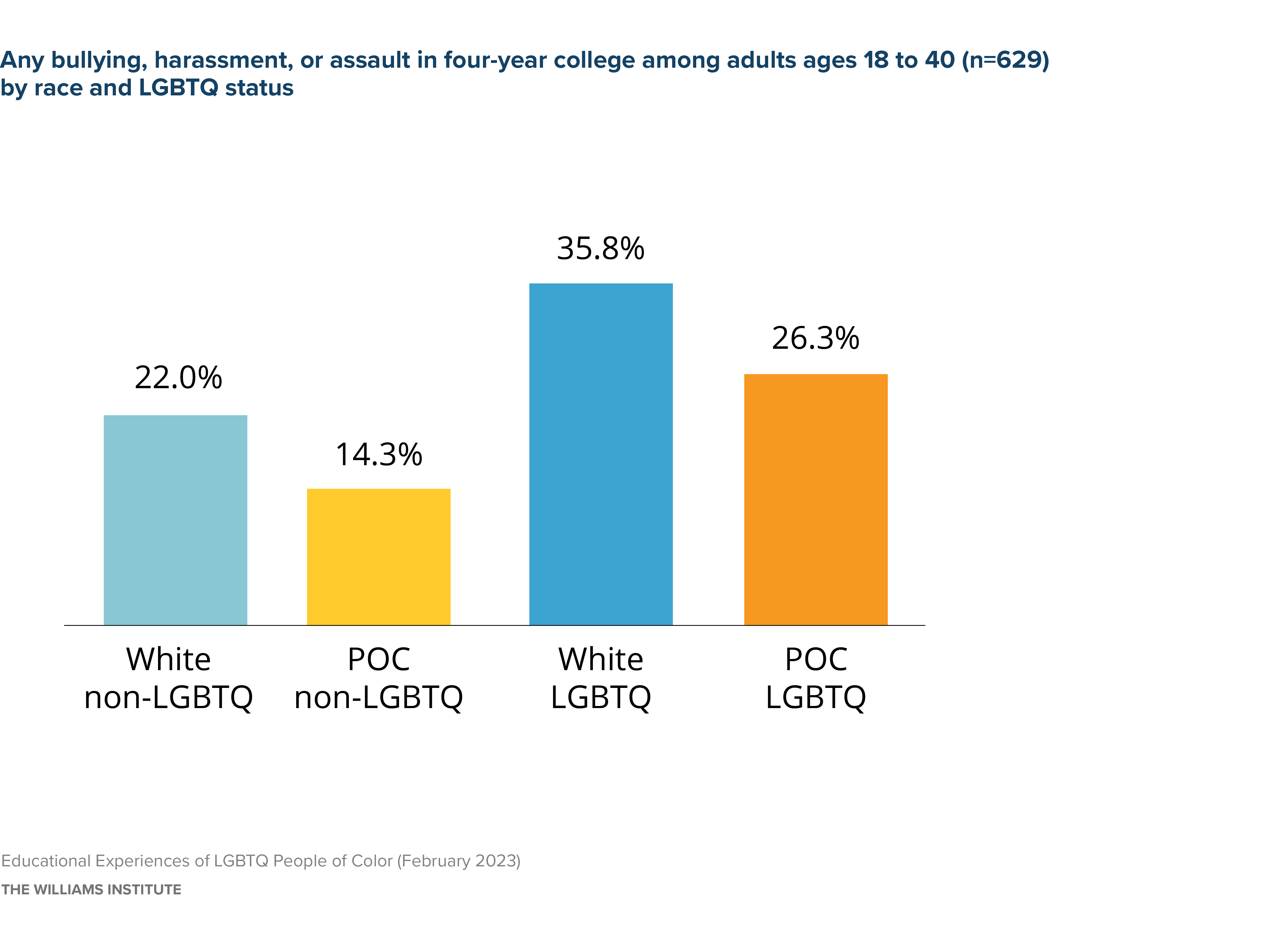
Approximately twice as many LGBTQ POC reported hearing slurs or negative comments about LGBTQ people in four-year college programs compared to their non-LGBTQ POC peers (36.2% v. 14.2%), and more than twice as many reported hearing slurs or negative comments about racial-ethnic minority people (43.4% v. 16.4%).
More than twice as many LGBTQ POC reported that, over their lifetimes, unfair treatment at school due to being LGBTQ was a barrier to their academic success than White LGBTQ adults (10.4% vs. 4.4%). More than twice as many LGBTQ POC as White LGBTQ (14.6% vs. 6.5%) people reported that lifetime school-based unfair treatment, harassment, or bullying due to being LGBTQ was a barrier to getting the amount of education, training, or degrees that they wanted.

At the time of survey completion, a smaller proportion of LGBTQ POC reported having ever attended four-year college than White LGBTQ adults. Over two-thirds (66.4%) of White non-LGBTQ adults reported attending at least some four-year college, which was higher than the percentage of LGBTQ POC (47%), non-LGBTQ POC (45.7%), and White LGBTQ adults (51.6%) reporting doing so.
Among adults ages 25 to 40, just over half (55.5%) of LGBTQ POC had completed any degree or vo-tech certification beyond high school—similar to the proportion (59.7%) among their non-LGBTQ POC counterparts. In contrast, a larger proportion—69.5%—of their White LGBTQ peers had completed a post-secondary degree or certificate by the age of 25.
Mental Health
Similar to White LGBTQ adults, more LGBTQ POC reported that their mental health was not good during community college than their non-LGBTQ peers. More than a quarter (28.7%) of LGBTQ POC said that their mental health was not good all or most of the time during community college. In contrast, half as many non-LGBTQ POC (13.2%) adults indicated that their mental health was not good all or most of the time.
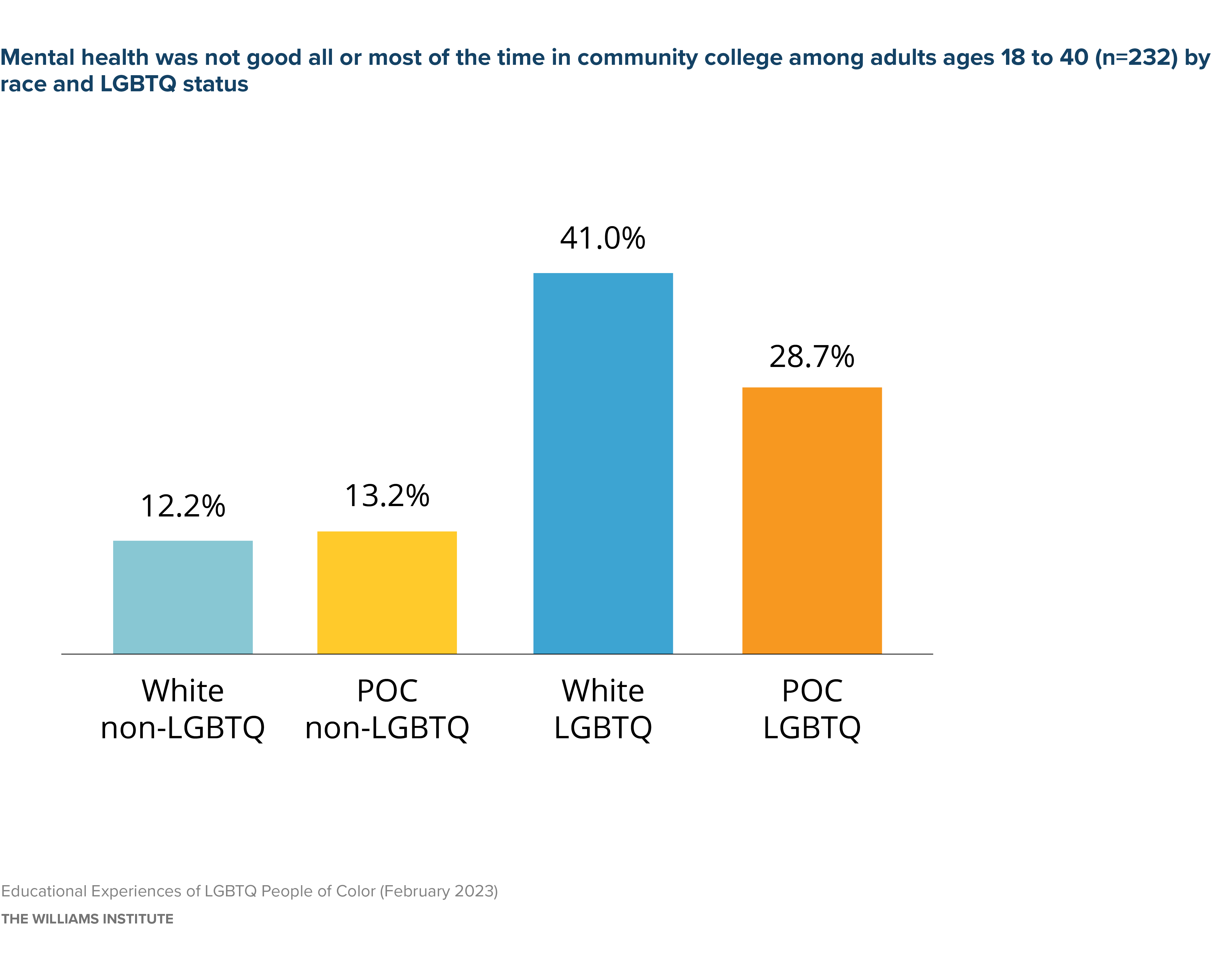
More than a third (34.4%) of LGBTQ people of color reported poor mental health during four-year college—three times the proportion (12.6%) as among their non-LGBTQ peers of color.
About a third of LGBTQ POC who had attended four-year college reported the presence of LGBTQ-supportive counseling services or LGBTQ-informed health services at their schools. Such services were less common at community colleges. Our findings indicate that high schools and colleges could do far more to support LGBTQ students of color by providing them with more information and support to prepare them for higher education, creating more inclusive and supportive learning environments, and protecting them from adverse and unfair treatment from other students, teachers, and staff.
Download the full report




